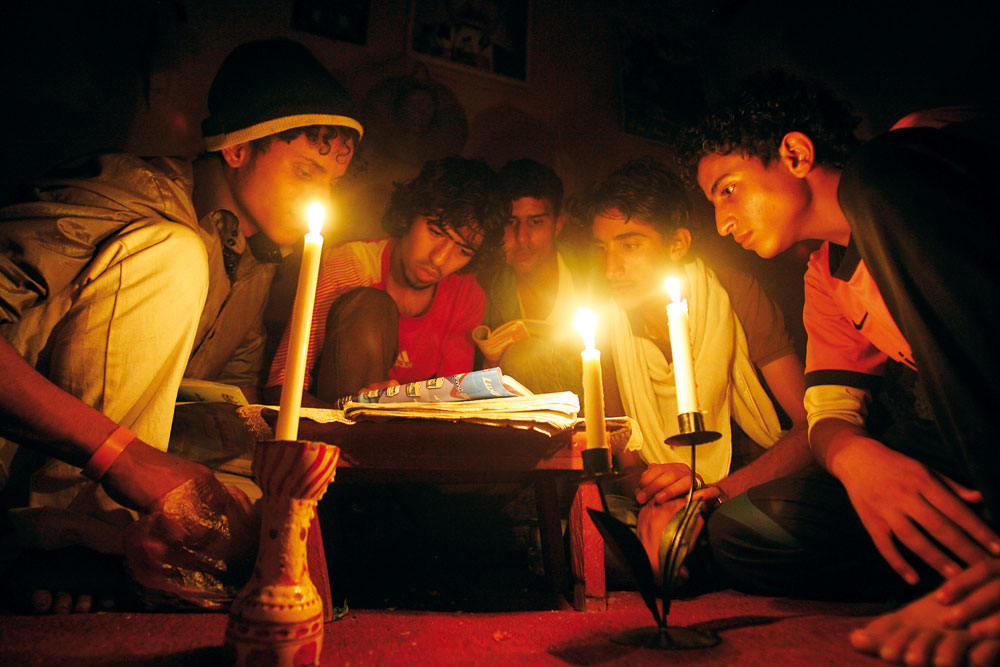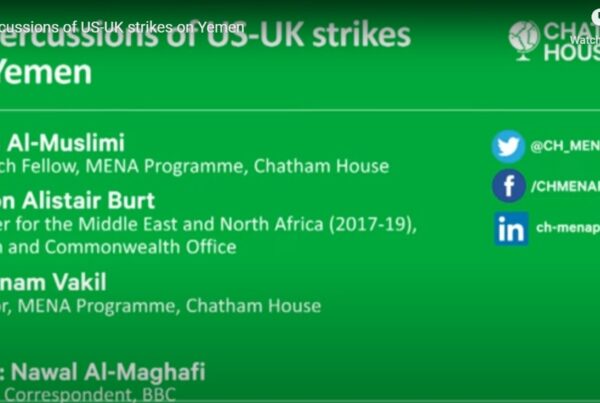There is a lot to be said about the ways humor can keep you going in times of hardship. Yemenis, who are all too familiar with adversity, have recently adopted a new favorite joke about their Ministry of Electricity. The ministry, people say, has tasked itself with supporting population growth, given that it is delivering less electricity to homes and sending Yemenis to bed that much earlier and often.
Electricity cuts are nothing new in the country, as Yemen produces around 1,000 megawatts, just a third of what is needed to power the country. Tribal attacks on the power grid in protest against unequal electricity provision have been common for years, but the problem has escalated: the state-owned power grid was hit on 59 different occasions between May 1, 2012 and March 15, 2013, according to Yemen’s Al Masdar media outlet, and in recent months the attacks seem to occur every other week. On June 19, a day after one such attack, Yemeni activists held a candlelit protest outside of President Abdu Mansour Hadi’s home in the hopes of pushing the government to be more accountable.
Yemen’s chaotic national dialogue
The new government attributes these attacks to tribes in the Marib governorate, which are using them to communicate financial and political grievances and demands, such as the release of prisoners, or even demands for electricity deliveries to tribal areas. A significant portion of Yemen’s electrical capacity has been generated in the Marib governorate since 2010. Even before capacity was added back then, inequities in national power distribution were the cause of disputes and protests, but things have gone downhill since. In 2011, the government of President Ali Abdallah Saleh in Sanaa was alleged to have created artificial power shortages to fend off calls for his resignation. Nowadays, opposition figures from the left and Islamist camps accuse Saleh and his cronies of staging the attacks to discredit their successors.
Regardless of the identity of perpetrators, the ramifications are devastating, in both political and economic terms. The loss of power has undermined trust in President Hadi’s government. This was exemplified at the end of May, when Hadi gave a speech saying that he would deal with the attackers with an “iron hand” — a threat left looking empty when just a few hours later, electricity wires were again sabotaged.
These attacks have repercussions on everyday living conditions, which are felt most strongly in coastal governorates, where summer heat can reach up to 50 degrees. This makes the issue much more serious than a simple dispute between tribes and the government, because most coastal governorates are in the south, where there is already a strong movement for secession. Prolonged, severe power cuts will play into the hands of separatists and worsen Yemen’s divide. Separatists already use the electricity cuts as a way to discredit the central government, buttressing the traditional claim that the north — where the attacks are actually happening — cannot co-exist with the south.
The economic repercussions of the power outages — which lasted for 48 hours on one occasion in Sanaa and could go on for 20 hours a day during the period of frequent power line attacks — are grim even in the mountainous and more moderate climate areas around the capital. Prices of everyday goods rise, and perishables wither much faster. Productivity at work decreases and repetitive, short power cuts damage all sorts of electrical appliances. There were even reports that life support machines in some hospitals stopped working.
Yemen is a country that is seriously struggling to match its population growth and developing economy with an adequate power supply. The recent crisis comes with several twists. It shows that the people of Sanaa are more vulnerable today than they may have been before, simply because their lives and businesses have become more electricity dependent. Wealthy people, who can afford private generators, are the least affected, while the poor are left without. The tribes that are attacking the power lines are also doing so out of frustration that these lines transport electricity generated in their home areas to which they are given no access, yet their attacks mostly affect those who are already disadvantaged.
Even more ironically, in the heart of Sanaa’s urban midnight darkness, one building always remains lit. The Al Saleh Mosque, built by former President Saleh, which houses his own personal museum in its basement, stays illuminated throughout the night by its own generators. Even with his fall from power, President Saleh’s memory stays brighter than the average Yemeni home.
Farea al-Muslimi is Executive’s correspondent in Yemen








